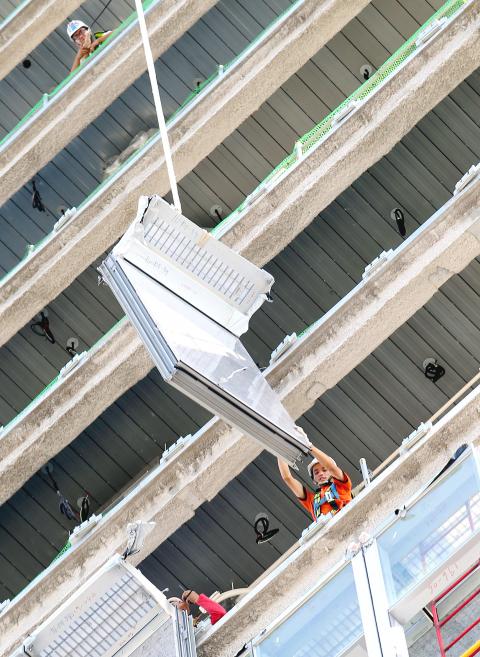Premier Jiang Yi-huah (江宜樺) yesterday decided that beginning next year, the minimum wage will be contingent on growth in the consumer price index (CPI), a policy drawing severe criticism from labor groups.
With a threshold of a cumulative CPI growth of 3 percent or higher needed before the minimum wage will be reviewed, “it is highly likely that the basic wage levels will remain stagnant in the remaining three years of President Ma Ying-jeou (馬英九) tenure,” Taiwan Labor Front secretary-general Son Yu-lian (孫友聯) said.
The Executive Yuan issued a press statement yesterday saying Jiang has given the green light to the proposed rises in hourly and monthly minimum wages, along with a policy to tie adjustments to minimum wages to CPI growth, presented by the Council of Labor Affairs last month.

Photo: CNA
Under the proposal, the minimum hourly wage will be raised from NT$109 to NT$115, starting Jan. 1 next year, while the minimum monthly wage, which is now NT$19,047, will be increased to NT$19,273, effective July 1 next year.
The Executive Yuan has assessed that more than 1.76 million workers paid monthly, including 240,000 migrant workers, and more than 310,000 hourly workers will benefit from the wage adjustment.
Meanwhile, beginning next year, the council’s Minimum Wage Review Committee, which holds an annual review on minimum wages, will be held only when CPI increases by 3 percent or higher, according to the proposal.
In the press statement, the Executive Yuan said that the council’s proposal was adopted by Jiang because consensus was reached among representatives of labor groups, businesses, academics and officials at the council’s committee.
Son disputed the Executive Yuan’s claim, saying labor groups have repeatedly questioned the legitimacy of reviewing the minimum wage only after the growth rate of CPI surpasses 3 percent.
It is a violation of Article 5 of the Regulations for the Deliberation of Basic Wage (基本工資審議辦法) that “the minimum wage review committee should on principle convene in the third quarter of every year to review wages,” Son said.
The rule gives the committee flexibility about when during the year it meets to consider the minimum wage, but it prescribes that it “must convene every year” to review whether adjustments should be made to the basic salary levels, he added.
Scrapping the rule unilaterally is “detrimental to Taiwan’s employment standards” and was “aimed at pleasing conglomerates,” Son said.
Furthermore, according to Article 4 of the Regulations for the Deliberation of Basic Wage, CPI was just one of the seven elements to be factored in when the committee reviews the minimum wages, Son said.
The article stipulated that the committee must also study conditions of national economic development, wholesale price index, national income and average individual income, labor productivity of different industries and their employment situation, workers’ wages in different industries, and statistical figures on household income and expenditure, in addition to the retail price index.
The council said last month that normally, 3 percent or higher CPI growth takes two years.

Right-wing political scientist Laura Fernandez on Sunday won Costa Rica’s presidential election by a landslide, after promising to crack down on rising violence linked to the cocaine trade. Fernandez’s nearest rival, economist Alvaro Ramos, conceded defeat as results showed the ruling party far exceeding the threshold of 40 percent needed to avoid a runoff. With 94 percent of polling stations counted, the political heir of outgoing Costa Rican President Rodrigo Chaves had captured 48.3 percent of the vote compared with Ramos’ 33.4 percent, the Supreme Electoral Tribunal said. As soon as the first results were announced, members of Fernandez’s Sovereign People’s Party

MORE RESPONSIBILITY: Draftees would be expected to fight alongside professional soldiers, likely requiring the transformation of some training brigades into combat units The armed forces are to start incorporating new conscripts into combined arms brigades this year to enhance combat readiness, the Executive Yuan’s latest policy report said. The new policy would affect Taiwanese men entering the military for their compulsory service, which was extended to one year under reforms by then-president Tsai Ing-wen (蔡英文) in 2022. The conscripts would be trained to operate machine guns, uncrewed aerial vehicles, anti-tank guided missile launchers and Stinger air defense systems, the report said, adding that the basic training would be lengthened to eight weeks. After basic training, conscripts would be sorted into infantry battalions that would take

GROWING AMBITIONS: The scale and tempo of the operations show that the Strait has become the core theater for China to expand its security interests, the report said Chinese military aircraft incursions around Taiwan have surged nearly 15-fold over the past five years, according to a report released yesterday by the Democratic Progressive Party’s (DPP) Department of China Affairs. Sorties in the Taiwan Strait were previously irregular, totaling 380 in 2020, but have since evolved into routine operations, the report showed. “This demonstrates that the Taiwan Strait has become both the starting point and testing ground for Beijing’s expansionist ambitions,” it said. Driven by military expansionism, China is systematically pursuing actions aimed at altering the regional “status quo,” the department said, adding that Taiwan represents the most critical link in China’s

‘REALLY PROUD’: Nvidia would not be possible without Taiwan, Huang said, adding that TSMC would be increasing its capacity by 100 percent Nvidia Corp CEO Jensen Huang (黃仁勳) on Saturday praised and lightly cajoled his major Taiwanese suppliers to produce more to help power strong demand for artificial intelligence (AI), capping a visit to the country of his birth, where he has been mobbed by adoring fans at every step. Speaking at an impromptu press conference in the rain outside a Taipei restaurant, where he had hosted suppliers for a “trillion-dollar dinner,” named after the market capitalization of those firms attending, Huang said this would be another good year for business. “TSMC needs to work very hard this year because I need a lot